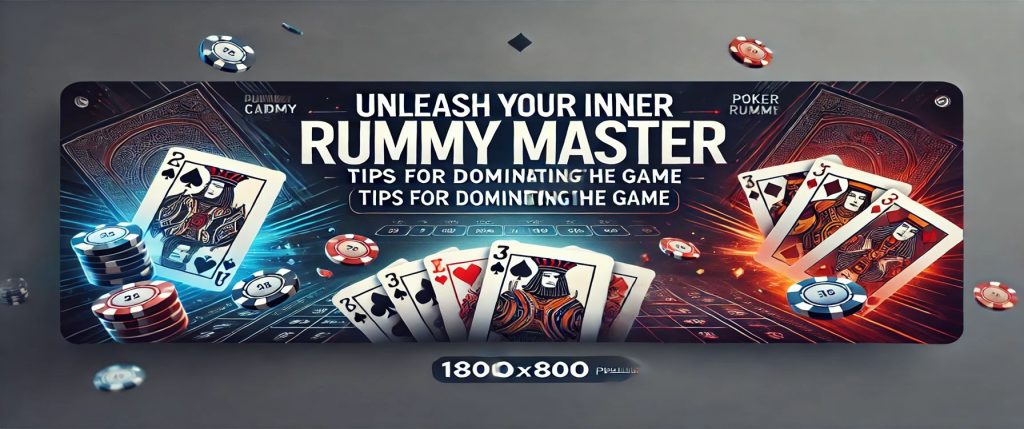
The Complete Guide to Rummy: Strategies, Skills, and Success For many years, players all over the world have been enthralled with the traditional card game of rummy. Its combination of strategy, skill, and a little bit of luck makes it a fun hobby for both serious competitors and casual players. If you want to play Rummy to the fullest, you must grasp the fundamentals. The fundamental objective of rummy is to merge all of your cards before your opponents do, which is accomplished by creating sets and runs from a hand of cards.
Three or four cards of the same rank but different suits make up a set, whereas three or more cards in the same suit make up a run. There are multiple versions of the game, each with its own special rules and subtleties, & it can be played with two or more players. Depending on the variation, players are dealt a set number of cards to start playing rummy, usually seven or ten. One card is turned face-up to begin the discard pile, and the other cards form a draw pile.
Before discarding one card from their hand, each player takes a turn drawing from the draw or discard pile. Until a single player successfully melds every card in their deck, the other players reveal their hands and begin calculating points using the unmelded cards. As they lay the groundwork for more complex strategies and tactics that can result in victory, an understanding of these basic mechanics is essential for building a strong foundation in rummy. The next stage after mastering the fundamentals of rummy is to create a winning strategy that will enable you to outplay your rivals. Being flexible is essential for a successful Rummy player because every game can offer different difficulties depending on the cards dealt & other players’ moves.
Prioritizing the formation of melds early in the game is one successful tactic. You can decrease the quantity of unmelded cards in your hand & improve your chances of going out ahead of your opponents by making the formation of sets and runs your top priority right away. In addition to keeping you ahead, this proactive strategy puts pressure on your rivals, making them play defensively. Managing cards is another crucial component of rummy strategy.
You can learn a lot about your opponents’ hands by keeping track of which cards have been discarded and which are still in play. For example, if you observe that a certain suit is being discarded a lot, it might mean that your opponents aren’t trying to use that suit for their melds. Your choices about which cards to keep or discard can be influenced by this information.
It’s also crucial to pay attention to the cards you discard; don’t discard any that might aid your opponents in finishing their melds. You can greatly increase your chances of winning at rummy by combining these two strategic components: early melding and clever card management. Discarding is a basic Rummy strategy that has a big impact on how the game turns out. It takes a keen awareness of both your hand and your opponents’ possible hands to become proficient in this art.
When choosing which card to discard, take into account both what your opponents might use and what you need to finish your own melds. For instance, it is usually better to discard a low-value card that does not contribute to your melds than one that might assist an opponent in finishing a set or run. “. You can keep control of the game by using this defensive strategy to keep your opponents from getting an advantage. Also, timing is very important when discarding. Depending on what has already been played, some cards may have different values as the game goes on. For example, it might be wise to discard a high-value card you are holding onto as soon as possible if it helps an opponent but does not fit into any melds.
Holding onto a card that is part of a possible meld but not immediately useful for a few turns could be advantageous while you wait for other cards to finish your hand. You can greatly enhance your gameplay & raise your chances of winning by carefully weighing your needs as well as those of your opponents when discarding. Jokers are extremely valuable assets in Rummy gameplay because they are wild cards that can represent any card in a meld. Gaining an understanding of the proper use of jokers can improve your strategy & increase your winnings.
Using jokers to finish challenging melds that would otherwise call for specialized cards that might not be easily accessible is a popular strategy. To declare earlier than anticipated, for example, you can use a joker to fill the gap if you are one card short of finishing a run or set. This adaptability has the potential to surprise adversaries and throw their plans off balance. But it’s crucial to use jokers sparingly.
Even though jokers can be effective tools for finishing melds, relying too much on them can result in missed chances to form pure sets or runs sans wild cards. Using too many jokers during declaring can even result in penalties or lower the final score in some Rummy variations. Therefore, whenever feasible, it’s a good idea to balance their use with conventional melds. Also, you can use the number of jokers played to help you decide whether to use them right away or hold onto them. Jokers can be used to their fullest potential while minimizing any negative effects if you strategically incorporate them into your gameplay.
In rummy, observation is just as crucial as strategy. Observing the movements of your opponents can give you important information about their hands and tactics. You can determine what melds they are attempting to form and which suits they are pursuing by keeping an eye on the cards they draw and discard. For example, it is likely that an opponent is attempting to finish a run or set in a particular suit if they routinely remove cards from the discard pile that are related to that suit while discarding cards that are unrelated. Knowing this enables you to modify your approach appropriately, either by concentrating on other suits or by obstructing their progress. Also, you can gain an advantage in gameplay by comprehending the psychology underlying the actions of your opponents.
Based on the strengths and weaknesses of their hands, players frequently display patterns in their decision-making. It may be a sign of doubt about the potential of their hand if an opponent frequently modifies their strategy mid-game or appears reluctant to discard specific cards. Knowing these signs will help you adjust your strategy, whether it’s playing aggressively to take advantage of their hesitation or taking a more defensive posture to shield your hand from possible dangers. The game of rummy challenges players’ emotional & mental toughness in addition to their skill. It’s essential to remain composed under duress in order to stay focused and make wise choices during the game.
When faced with difficult circumstances, like holding onto valuable cards while awaiting particular draws, it’s simple to feel nervous or irritated. Nonetheless, remaining calm enables you to think more clearly and weigh your options more skillfully. Before or during gameplay, you can reduce stress and maintain your composure by engaging in deep breathing exercises or mindfulness practices. Also, having a positive outlook can have a big impact on how well you play rummy. Focus on what you can control, such as your strategy and decision-making process, rather than obsessing over possible losses or unfavorable draws.
Accept every turn as a chance to grow & change, not as a source of stress. This change in viewpoint not only makes the game more enjoyable for you, but it also helps you perform better overall by giving you the confidence & clarity to tackle obstacles. In rummy, declaring is a crucial move that can affect how the game turns out.
The current state of play and your hand must be carefully considered when deciding when to declare. When you have successfully formed all of your melds and have few unmelded cards remaining in your hand, it is customary to declare. Ideally, these cards should be low-value cards that will reduce the number of points your opponents will have if they cannot yet declare themselves. However, timing is crucial; if other players are almost finished with their hands, declaring too soon could leave you exposed. Also, before declaring anything, it’s critical to assess the game’s dynamics.
Some players may be on the verge of declaring themselves if you observe that they are reluctant to discard certain cards or are holding onto high-value cards. In these situations, it could be prudent to wait to declare until you have further cemented your position or thwarted their plans with calculated throws. In the end, becoming proficient at timing declarations requires striking a balance between having faith in your hand and being conscious of the larger game context.
To become good at Rummy, as with any skill-based game, practice is essential. You can improve your tactics and gain a better grasp of the nuances of the game by playing with friends or family on a regular basis. Think about trying out various Rummy variations as well; each one has its own set of rules & difficulties that can help you become a more versatile player. You can test new tactics without the pressure of in-person competition thanks to online platforms that also offer practice against different skill levels. After every game, self-evaluation can also be very helpful for player development.
Spend some time examining pivotal moments in the game to determine what went well, what didn’t, and how you can get better in subsequent games. Making notes on effective tactics or typical pitfalls can be a great way to remember them for later games. You can improve your skills and heighten your enjoyment of this classic card game by dedicating yourself to lifelong learning & development via practice and introspection. In summary, learning Rummy necessitates a combination of comprehension of the game’s foundations, strategic thinking, the development of particular abilities such as efficiently discarding & using jokers, observing the moves of opponents, remaining composed under pressure, knowing when to declare, & a dedication to continuous practice and improvement.
Players can improve their gameplay experience and still enjoy one of the most popular card games in the world by embracing these components.


